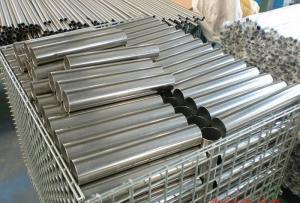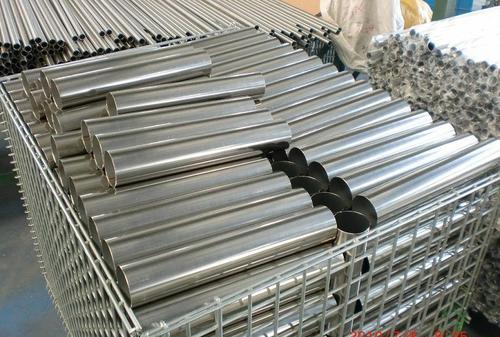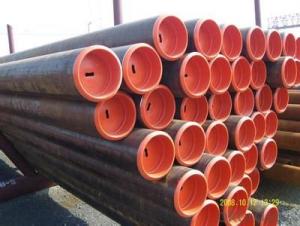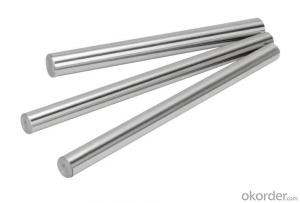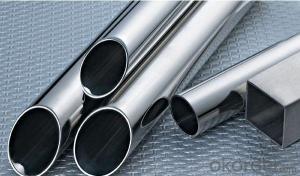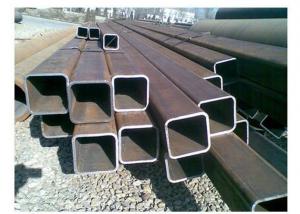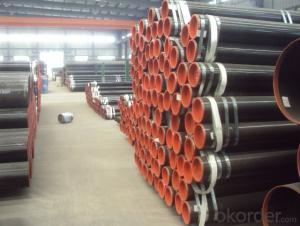Stainless steel seamless tube of health
- Loading Port:
- China Main Port
- Payment Terms:
- TT OR LC
- Min Order Qty:
- -
- Supply Capability:
- -
OKorder Service Pledge
Quality Product, Order Online Tracking, Timely Delivery
OKorder Financial Service
Credit Rating, Credit Services, Credit Purchasing
You Might Also Like
Food grade stainless steel seamless pipe mill, specifications 16*1-219*3, inside and outside polishing, mainly used in food, health, water pipe, air, refrigeration,automotive and other industries, 5 roller mill finishing, excellent quality, affordable price
- Q: What are the safety precautions to follow while working with steel pipes?
- To ensure a safe working environment when dealing with steel pipes, it is crucial to adhere to specific safety measures. Consider the following key precautions: 1. Personal Protective Equipment (PPE): Always wear appropriate PPE, such as safety goggles, gloves, steel-toed boots, and a hard hat. This will shield you from potential hazards like falling objects, sharp edges, or flying particles. 2. Practice proper lifting methods: Given that steel pipes can be heavy and unwieldy, employ correct lifting techniques like bending your knees and utilizing your leg muscles to avoid straining your back or causing musculoskeletal injuries. 3. Secure the work area: Eliminate any clutter or obstacles in the work area that may present a tripping hazard. Ensure that the pipes are stored and secured adequately to prevent rolling or falling. 4. Exercise caution around sharp edges: Steel pipes often possess sharp edges that can cause cuts or punctures. Handle them with care and consider using protective covers or gloves to prevent injuries. 5. Utilize appropriate tools: Use the correct tools and equipment for cutting, welding, or manipulating steel pipes. Adhere to manufacturer instructions and guidelines to ensure safe usage. 6. Avoid working in confined spaces: Working in cramped areas presents significant risks. If necessary, ensure proper ventilation and adhere to confined space entry protocols to prevent asphyxiation or other hazards. 7. Adhere to proper welding procedures: When welding is involved, follow appropriate welding procedures and guarantee adequate ventilation in the workspace. Employ fire-resistant blankets or screens to protect nearby combustible materials. 8. Be cautious of hot surfaces: Steel pipes can become hot during welding or other processes. Utilize appropriate insulation or heat-resistant gloves to safeguard yourself against burns or heat-related injuries. 9. Establish effective communication: Establish clear channels of communication with colleagues, especially during tasks like lifting or moving heavy objects. Use hand signals or verbal communication to ensure everyone is on the same page and to prevent accidents. 10. Regularly inspect tools and equipment: Before commencing any task, inspect tools, equipment, and scaffolding for damages or defects. Report and replace any faulty equipment to prevent accidents. Always prioritize safety when working with steel pipes. By adhering to these precautions and using common sense, you can guarantee a safe working environment for yourself and your colleagues.
- Q: Can steel pipes be used for conveyor systems?
- Yes, steel pipes can be used for conveyor systems. Steel pipes are commonly used in conveyor systems due to their high strength, durability, and ability to withstand heavy loads and harsh environments. They provide a reliable and long-lasting solution for transporting various materials in conveyor applications.
- Q: What is the average lifespan of a steel pipe?
- The average lifespan of a steel pipe can vary depending on various factors such as its quality, usage conditions, maintenance, and exposure to external factors. However, on average, a properly installed and maintained steel pipe can last anywhere from 20 to 100 years or more.
- Q: What is the flexibility of steel pipes?
- Steel pipes are known for their exceptional flexibility, making them highly versatile and suitable for a wide range of applications. The flexibility of steel pipes refers to their ability to bend and withstand various forms of stress without breaking or deforming. This flexibility is primarily due to the inherent properties of steel, such as its high tensile strength and ductility. Steel pipes can be bent and formed into different shapes without compromising their structural integrity. This allows for easier installation and routing around obstacles, making them more adaptable for complex plumbing or piping systems. Additionally, the flexibility of steel pipes enables them to withstand external forces, such as ground movements or temperature fluctuations, without experiencing significant damage. The flexibility of steel pipes also makes them suitable for applications that require dynamic movement or expansion. For instance, in oil and gas pipelines or in heating and cooling systems, where temperature variations can cause expansion and contraction, steel pipes are able to accommodate these changes without causing leaks or failures. Furthermore, the flexibility of steel pipes contributes to their durability and longevity. The ability to withstand bending and stress helps prevent the formation of cracks or fractures that can lead to leaks or structural failures. This characteristic makes steel pipes a reliable choice for demanding environments, including high-pressure systems or corrosive conditions. In summary, the flexibility of steel pipes is a crucial attribute that allows for easy installation, adaptability to various conditions, and long-term reliability. With their exceptional flexibility, steel pipes are widely preferred in numerous industries and applications where strength, durability, and versatility are essential.
- Q: What are the lengths of scaffold steel tubes?
- Scaffold tubes are our name for materials used to build scaffolding, because most scaffolding uses tubular bamboo or steel tubing. Bamboo and other bamboo is for a long time in the use of the scaffolding tube, but due to lack of safety and durability, now only in rural and urban area construction is lagging behind some of the home building small building has been used. The modernization construction, the most commonly used type of scaffolding pipe is steel pipe, the scaffolding should not only meet the demand of workers, but also to meet the characteristics of scaffolding firm and durable, so tough hard steel is the best choice. The selected steel pipe generally requires smooth surface, no cracks, no bending, no rust, and meet the relevant national standards.
- Q: What are the different types of steel pipe supports for thermal expansion?
- There are several types of steel pipe supports for thermal expansion, including fixed supports, sliding supports, and variable spring supports. Fixed supports are rigid and do not allow for movement, while sliding supports allow for limited axial movement. Variable spring supports use mechanical springs to accommodate thermal expansion and contraction, providing continuous support while allowing for movement.
- Q: What is the difference between hot-rolled and cold-rolled steel pipes?
- Hot-rolled steel pipes are manufactured by heating the steel billets or coils to a high temperature, which allows for easier shaping and forming. The hot-rolled process also results in a rougher surface finish and larger tolerances. In contrast, cold-rolled steel pipes are made by rolling the steel at a lower temperature, resulting in a smoother surface finish, tighter tolerances, and improved strength and durability.
- Q: Are steel pipes suitable for use in sewage treatment plants?
- Yes, steel pipes are suitable for use in sewage treatment plants. They are durable, strong, and resistant to corrosion, making them ideal for handling the harsh environment and corrosive substances found in sewage treatment plants. Steel pipes also offer excellent flow characteristics and can withstand high pressure, making them reliable for transporting wastewater and sewage within the facility.
- Q: What are the common defects found in steel pipes?
- Some common defects found in steel pipes include corrosion, cracks, pitting, scaling, and distortion.
- Q: What is the cost of steel pipes?
- The cost of steel pipes can vary depending on factors such as the size, grade, and quantity needed, as well as market conditions and supplier. It is recommended to contact suppliers or check online platforms to get specific pricing information.
Send your message to us
Stainless steel seamless tube of health
- Loading Port:
- China Main Port
- Payment Terms:
- TT OR LC
- Min Order Qty:
- -
- Supply Capability:
- -
OKorder Service Pledge
Quality Product, Order Online Tracking, Timely Delivery
OKorder Financial Service
Credit Rating, Credit Services, Credit Purchasing
Similar products
Hot products
Hot Searches
Related keywords
